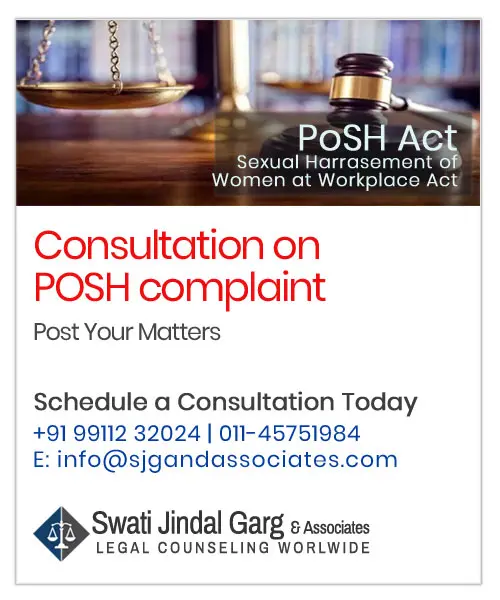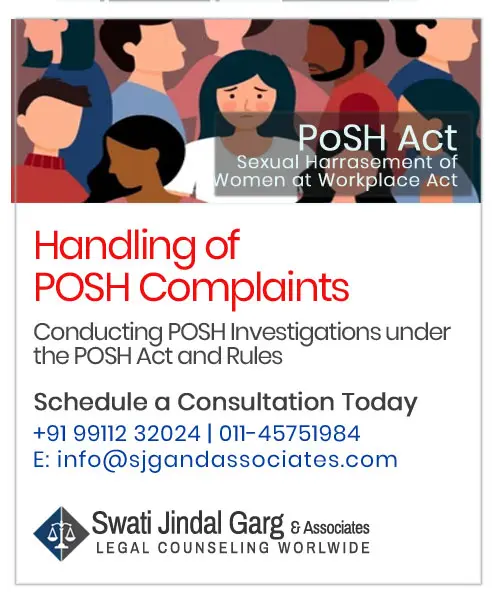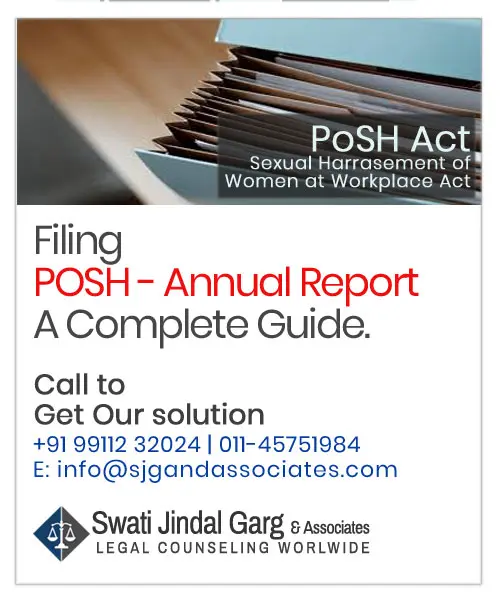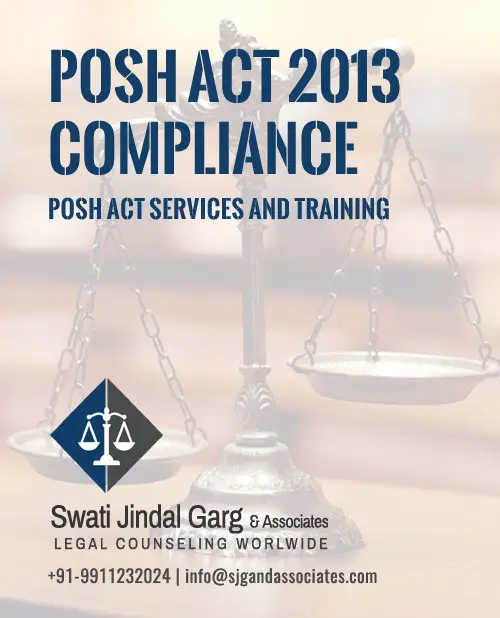Swati Jindal Garg & Associates
POSH & Sexual Harassment law compliance Law Firm In Delhi, India
POSH Act Compliance proceeding by helping organisations put in place all the mandatory compliance, enabling worlplaces to be inclusive, diverse and gender neutral.. Need Legal expert services on POSH Act Legal matters? Contact registered practitioner advocate for POSH law and sexual harassment law compliance Legal services at +91 99112 32024, +91 11-45751984 or email us at info@sjgandassociates.com for brief description of your legal issue.

Area Of Practice
POSH Compliance Law Firm In Delhi
POSH law & Sexual Harassment Law Compliance Services.
The Sexual Harassment of Women at Workplace (Prevention, Prohibition & Redressal) Act and Rules, 2013 (“Law”) mandates every Employer to “provide a safe working environment at the workplace which shall include safety from the persons coming into contact at the workplace” (Section 19 (a)).
For this, it provides that the aggrieved can file a complaint of sexual harassment within the organization itself and seek redressal via the internal mechanism. For the success of this, all organizations (whether public or private) having 10 or more employees (whether permanent, temporary, ad-hoc, consultants, interns or contract workers irrespective of gender) are mandated under Law to comply with certain requirements.
PoSH Legal Advisory Services By PoSH Lawyer.
POSH & Sexual Harassments Compliance matters.
The POSH Act prescribes that failure by an employer to constitute an ICC is an offence punishable with fine for an amount of up to Rupees Fifty Thousand. Further, an employer convicted for the same offence at the second instance may be punishable with a fine for twice such amount, as well as be liable to cancellation or non-renewal of its business licenses, registrations or approvals by the government or local authorities.
We have served
Government and Public sectors, National and International Enterprises, Societies, NGO’s, MNC’s, Financial Institutions & Banks, Telecom, IT, FMCG, Telecom, E-commerce, Electronics, Energy and Consumer durables category, NRI’s and private individuals.
Need Legal expert services on POSH Act Legal matters?
Contact registered practitioner advocate for POSH law and sexual harassment law compliance Legal services at +91 99112 32024, +91 11-45751984 or email us at info@sjgandassociates.com for brief description of your legal issue.
Schedule Your Consultation
POSH ACT, 2013
Related Keywords
POSH Consultants in Delhi, POSH Training & Compliance, POSH Training & Compliance for schools, POSH Training & Compliance for corporates, POSH Training & Compliance for multinationals, POSH Training & Compliance for NGOs, POSH Training & Compliance for Government Organisations, PoSH COMPLIANT WORKPLACES, Complaint procedure for Sexual harassment complaint, sexual harassment complaint, Sexual harassment at workplace, False complaint filed by women at workplace.
FAQ (Frequently asked Questions)
1. How can I identify sexual harassment in the workplace?
‘The Sexual Harassment of Women at Workplace (Prevention, Prohibiton and Redressal) Act, 2013 (‘POSH act’), defines sexual harassment. According to section 2(n),
“Sexual Harassment” includes any one or more of the following unwelcome acts or behavior (whether directly or by implication) namely:—
(i) physical contact and advances; or
(ii) a demand or request for sexual favours; or
(iii) making sexually coloured remarks; or
(iv) showing pornography; or
(v) any other unwelcome physical, verbal or non-verbal conduct of sexual nature;
Sexually coloured remarks and actions may be considered sexual harassment. Broadly, some examples include:
Verbal behavior which is sexual in nature and unwelcome, e.g., epithets, jokes, comments or slurs, repeated requests for dates which are unwelcome.
Nonverbal behavior which is sexual in nature and unwelcome, e.g., staring, leering, lewd gestures.
Physical conduct which is sexual in nature and unwelcome, e.g., assaults, sexual advances such as touching, patting, or pinching, impeding or blocking, movement or any physical interference with normal work or movement;
Visuals which are sexual in nature and unwelcome, e.g., posters or signs, letters, poems, graffiti, faxes, cartoons or drawings, pictures, calendars, electronic mail and computer programs.
Where can I file a sexual harassment complaint?
An aggrieved woman can file a complaint with the Internal Complaints Committee (ICC) of the organisation. In case of an organisation with less than 10 members, a Local Complaints Committee (LCC) must be established, to which the woman can submit her complaint.
One may also file their complaint under the SH-e Box initiative of the Ministry of Women & Child Development. This Sexual Harassment electronic Box (SHe-Box) is an effort of GoI to provide a single window access to every woman, irrespective of her work status, whether working in organised or unorganised, private or public sector, to facilitate the registration of complaint related to sexual harassment. The initiative is driven by a strong support to women so as to provide them with adequate resources.
What should my complaint contain?
According to the POSH act, any aggrieved woman may make, in writing, a complaint of sexual harassment at workplace to the Internal Committee if so constituted, or the Local Committee, in case it is not so constituted, within a period of three months from the date of incident and in case of a series of incidents, within a period of three months from the date of last incident.
A written complaint must contain:-
- Description of each incident(s)
- Name of the Respondent/Offender
- Dates of each incident(s)
- Timings
- Locations
- Working relationship between the Parties
Questions pertaining to certain situations-
Must Sexual Harassment only be physical in nature?
No, physical contact is not necessary for an action to account for sexual harassment.
In the case of Apparel Export Promotion v. A.K. Chopra, the Supreme Court enlarged the definition of sexual harassment by ruling that physical contact was not necessary for an act to amount to sexual harassment
Therefore, the Supreme Court explained that:-
‘Sexual harassment is a form of sex discrimination projected through unwelcome sexual advances, request for sexual favours and other verbal or physical conduct with sexual overtones, whether directly or by implication, particularly when submission to or rejection of such conduct by the female employee was capable of being used for affecting the employment of the female employee and unreasonably interfering with her work performance and had the effect of creating an intimidating or hostile work environment for her.’
Who can file a complaint of sexual harassment at workplace ?
According to the POSH Act, any woman who is working in or visiting a workplace for the purpose of employment can file a complaint. She can be working as a permanent, temporary or adhoc employee or on daily-wages, voluntary or contract basis. A visitor, probationer, trainee, apprentice and intern are also entitled to file a complaint.
Does the law protect me from Sexual Harassment at the workplace?
Yes, the law protects women from sexual harassment in the workplace. This is encapculated within‘The Sexual Harassment of Women at Workplace (Prevention, Prohibiton and Redressal) Act, 2013, also known as the ‘POSH Act’.
India’s first legislation specifically addressing the issue of workplace sexual harassment; the Sexual Harassment of Women at Workplace (Prevention, Prohibition and Redressal) Act, 2013 (“POSH Act”) was enacted by the Ministry of Women and Child Development, India in 2013.
The year 2013 also witnessed the promulgation of the Criminal Law (Amendment) Act, 2013 (“Criminal Law Amendment Act”) which has criminalized offences such as sexual harassment, stalking and voyeurism.
The Act provides a civil remedy to women. Consequently, any woman who wishes to report instances of sexual harassment at the workplacehas the right to take recourse of both civil and criminal proceedings.
It is important for you to know that:
- Workplace sexual harassment is a form of gender discrimination which violates the following fundamental rights of a woman:
- Articles 14 and 15: Right to Equality
- Article 21: Right to life – the right to live with dignity
- Article 19(1)(g): Right to practice any profession/trade/occupation/business, i.e., a right to a safe environment free from harassment.
Imporatant Related Links
Training Conducted
Trained Employee
Year of Experience
Rating Received
Internal Complaints Committee(ICC) – Sexual Harassment
The details with regard to the Act & rules, role, functions etc. of ICC are as given below:-
1. Sexual Harassment of Women at Workplace(Prevention, Prohibition and Redressal) Act and Rule 2013. Download Here
2. Handbook on Sexual Harassment of Women at Workplace. Download Here
3. DoP&T O.M. dated 1st November, 2017 regarding Online Complaint Management system titled “Sexual Harassment electronic box (SHe-box)”. Download Here
List of PoSH Services








Latest NEWS / Updates
The latest legal news from The Lawyer, covering India and international deals, disputes, lateral hires and updates on law firms and the Bar.
Whither POSCO
Pathetic pendency and controversial rulings mar the special legal protection to child victims of sexual offences For More Details
POSH Act 2013: The Road That Lies Ahead – III
POSH is compulsory to ensure safety at workplaces for every person and it is also in keeping with our Constitution which talks about right to equality at workplace
POSH Act 2013: The Road That Lies Ahead – II
POSH is compulsory to ensure safety at workplaces for every person and it is also in keeping with our Constitution which talks about right to equality at workplace
Note:
As per the rules of the Bar Council of India, we are not permitted to solicit work and advertise. The user acknowledges that there has been no advertisement and personal communication from SJG, any information obtained or material downloaded from this website is completely at the user’s volition and any transmission, receipt or use of this site would not create any lawyer-client relationship. In cases where the user has any legal issues, he/she in all cases must seek independent legal advice.




